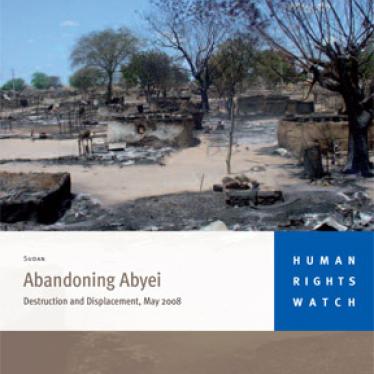Tens of thousands of civilians are still unable to return to the contested town of Abyei, two months after half of the town was destroyed in fighting, Human Rights Watch said in a report released today.
A Human Rights Watch investigation in June 2008 documented the deaths of at least 18 civilians in the fighting in mid-May, most of them deliberately killed by Sudanese Armed Forces (SAF) or allied militia. Due to SAF restrictions on access to the area in the weeks following the fighting, the total number of casualties remains unknown.
The 32-page report, “Abandoning Abyei: Destruction and Displacement, May 2008,” documents human rights violations committed by SAF forces and allied militia before, during, and after clashes with Sudanese Peoples’ Liberation Army (SPLA) of Southern Sudan between May 13 and 21. Abyei inhabitants who had fled south of the town told Human Rights Watch that SAF soldiers shot civilians who were trying to flee, and detained and then arbitrarily killed others.
“Two months after the clashes there is still no clear information on how many civilians died and under what circumstances,” said Georgette Gagnon, Africa director at Human Rights Watch. “Without a full and independent investigation, accountability for the killings, looting, and massive destruction in Abyei will not be possible.”
According to information obtained by Human Rights Watch during and after the fighting, SAF soldiers and allied militia carried out massive looting and destroyed more than half the town. By May 17 they had burned more than half the homes in Abyei to the ground and completely destroyed the market. Soldiers and militia also looted and set fire to compounds and property of UN and humanitarian agencies in Abyei.
A full and independent investigation into the killing and other abuses has so far not been possible because SAF forces restricted access to Abyei in the weeks following the fighting.
According to the United Nations Office for the Coordination of Humanitarian Affairs, approximately 60,000 people fled the town during the fighting, and at least 50,000 are still living in temporary shacks or crowded into homes with other families in Twic County, south of Abyei. The northern government and the Government of Southern Sudan reached a deal on June 7 – the “Abyei Roadmap” – which called on both sides to withdraw their forces from the area and deploy a new Joint Integrated Unit (JIU), with forces from both sides, to provide security in the town. However, neither side has completely withdrawn its troops. Displaced people from Abyei told Human Rights Watch they would not go home until this was done, out of fear of a return to violence.
“Displaced people told us repeatedly that they could not go home until Abyei was safe,” said Gagnon. “To them ‘safe’ means the complete withdrawal of the SAF, and for the joint unit to be up and running.”
The United Nations Mission in Sudan (UNMIS) was aware of growing tensions and the buildup of troops in Abyei since late 2007, yet when fighting broke out only 200 troops were deployed there – a force that was insufficient to protect civilians and their property in the face of the large-scale fighting and destruction. UNMIS was also hampered by long-standing restrictions on its movement by both the SAF and SPLA, despite a mandate that guarantees full freedom of movement.
“UNMIS has long known Abyei is a potential flashpoint for violence,” said Gagnon. “It should urgently take steps to assure the mission has the capability in place to fulfill its mandate to protect civilians.”
At the request of the Security Council, UNMIS has conducted an initial investigation into its own role in the run-up to and during the fighting, and Secretary-General Ban Ki-moon is expected to include initial findings in his quarterly report to the Security Council on July 24.
Meanwhile, delays in implementation of the roadmap are leading to renewed tension between the two sides. On July 7, a SPLM soldier shot and injured a UN military observer and a SAF monitor in Agok, south of Abyei.
“A return to violence in Abyei could have massive repercussions for the whole of Sudan,” said Gagnon. “Khartoum and the Government of South Sudan need to implement the roadmap in full and on time, and the UN and governments should put pressure on them to do so.”







